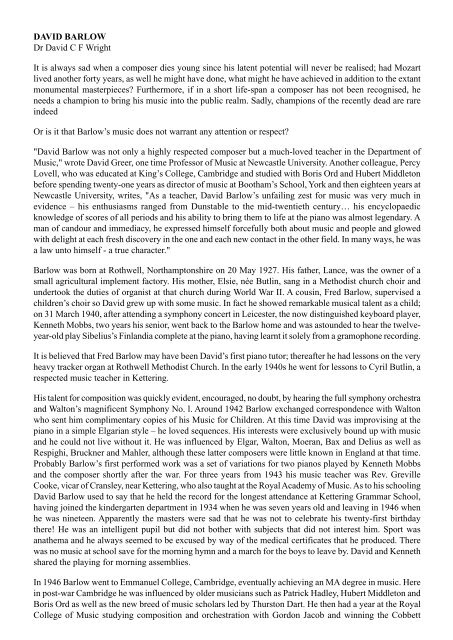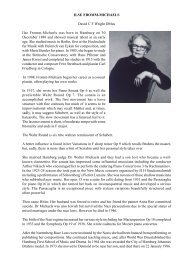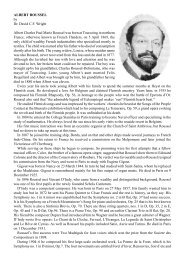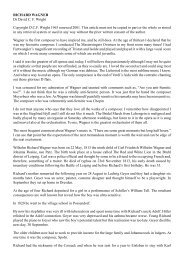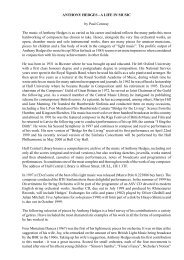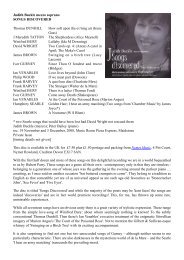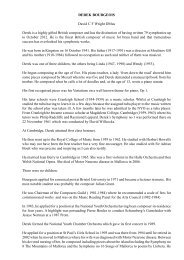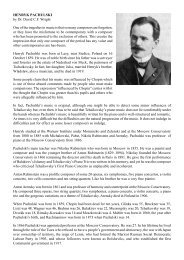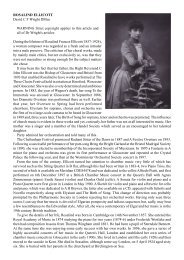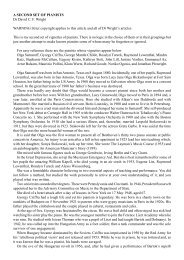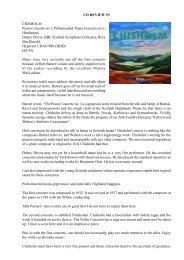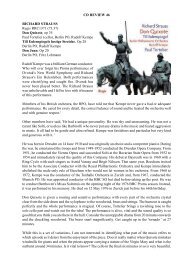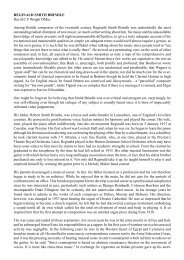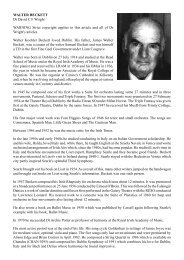David Barlow - Dr David Wright
David Barlow - Dr David Wright
David Barlow - Dr David Wright
Create successful ePaper yourself
Turn your PDF publications into a flip-book with our unique Google optimized e-Paper software.
DAVID BARLOW<br />
<strong>Dr</strong> <strong>David</strong> C F <strong>Wright</strong><br />
It is always sad when a composer dies young since his latent potential will never be realised; had Mozart<br />
lived another forty years, as well he might have done, what might he have achieved in addition to the extant<br />
monumental masterpieces Furthermore, if in a short life-span a composer has not been recognised, he<br />
needs a champion to bring his music into the public realm. Sadly, champions of the recently dead are rare<br />
indeed<br />
Or is it that <strong>Barlow</strong>’s music does not warrant any attention or respect<br />
"<strong>David</strong> <strong>Barlow</strong> was not only a highly respected composer but a much-loved teacher in the Department of<br />
Music," wrote <strong>David</strong> Greer, one time Professor of Music at Newcastle University. Another colleague, Percy<br />
Lovell, who was educated at King’s College, Cambridge and studied with Boris Ord and Hubert Middleton<br />
before spending twenty-one years as director of music at Bootham’s School, York and then eighteen years at<br />
Newcastle University, writes, "As a teacher, <strong>David</strong> <strong>Barlow</strong>’s unfailing zest for music was very much in<br />
evidence – his enthusiasms ranged from Dunstable to the mid-twentieth century… his encyclopaedic<br />
knowledge of scores of all periods and his ability to bring them to life at the piano was almost legendary. A<br />
man of candour and immediacy, he expressed himself forcefully both about music and people and glowed<br />
with delight at each fresh discovery in the one and each new contact in the other field. In many ways, he was<br />
a law unto himself - a true character."<br />
<strong>Barlow</strong> was born at Rothwell, Northamptonshire on 20 May 1927. His father, Lance, was the owner of a<br />
small agricultural implement factory. His mother, Elsie, née Butlin, sang in a Methodist church choir and<br />
undertook the duties of organist at that church during World War II. A cousin, Fred <strong>Barlow</strong>, supervised a<br />
children’s choir so <strong>David</strong> grew up with some music. In fact he showed remarkable musical talent as a child;<br />
on 31 March 1940, after attending a symphony concert in Leicester, the now distinguished keyboard player,<br />
Kenneth Mobbs, two years his senior, went back to the <strong>Barlow</strong> home and was astounded to hear the twelveyear-old<br />
play Sibelius’s Finlandia complete at the piano, having learnt it solely from a gramophone recording.<br />
It is believed that Fred <strong>Barlow</strong> may have been <strong>David</strong>’s first piano tutor; thereafter he had lessons on the very<br />
heavy tracker organ at Rothwell Methodist Church. In the early 1940s he went for lessons to Cyril Butlin, a<br />
respected music teacher in Kettering.<br />
His talent for composition was quickly evident, encouraged, no doubt, by hearing the full symphony orchestra<br />
and Walton’s magnificent Symphony No. l. Around 1942 <strong>Barlow</strong> exchanged correspondence with Walton<br />
who sent him complimentary copies of his Music for Children. At this time <strong>David</strong> was improvising at the<br />
piano in a simple Elgarian style – he loved sequences. His interests were exclusively bound up with music<br />
and he could not live without it. He was influenced by Elgar, Walton, Moeran, Bax and Delius as well as<br />
Respighi, Bruckner and Mahler, although these latter composers were little known in England at that time.<br />
Probably <strong>Barlow</strong>’s first performed work was a set of variations for two pianos played by Kenneth Mobbs<br />
and the composer shortly after the war. For three years from 1943 his music teacher was Rev. Greville<br />
Cooke, vicar of Cransley, near Kettering, who also taught at the Royal Academy of Music. As to his schooling<br />
<strong>David</strong> <strong>Barlow</strong> used to say that he held the record for the longest attendance at Kettering Grammar School,<br />
having joined the kindergarten department in 1934 when he was seven years old and leaving in 1946 when<br />
he was nineteen. Apparently the masters were sad that he was not to celebrate his twenty-first birthday<br />
there! He was an intelligent pupil but did not bother with subjects that did not interest him. Sport was<br />
anathema and he always seemed to be excused by way of the medical certificates that he produced. There<br />
was no music at school save for the morning hymn and a march for the boys to leave by. <strong>David</strong> and Kenneth<br />
shared the playing for morning assemblies.<br />
In 1946 <strong>Barlow</strong> went to Emmanuel College, Cambridge, eventually achieving an MA degree in music. Here<br />
in post-war Cambridge he was influenced by older musicians such as Patrick Hadley, Hubert Middleton and<br />
Boris Ord as well as the new breed of music scholars led by Thurston Dart. He then had a year at the Royal<br />
College of Music studying composition and orchestration with Gordon Jacob and winning the Cobbett
Chamber Music Prize with a String Trio: Phantasy in E Minor in 1950. He also studied the piano with <strong>Dr</strong>.<br />
Thomas Fielding. After RCM he had a year based at home in Rothwell engaging in some extra-mural lecturing<br />
and obtaining his B.Mus. having, for his practical examination, to play the Brahms Handel Variations.<br />
In 1951 he was appointed lecturer in music at King’s College (now the university) Newcastle-upon-Tyne,<br />
becoming senior lecturer in 1968, the year in which he was instrumental in bringing Nadia Boulanger to<br />
Newcastle to receive the honorary degree of Doctor of Music. <strong>Barlow</strong> was greatly influenced by Boulanger<br />
in his final decade, often attending her annual summer schools in Fontainebleau which largely attracted<br />
Americans. Several works were composed or begun here, such as My Heart is Smitten (1964) and November<br />
1951 (1967).<br />
<strong>Barlow</strong>’s first professional performance was his catchy Open Air Piece conducted by Alexander Gibson<br />
with the RCM Student Orchestra in 1950. The Symphony No.1 in E minor, which also dates from 1950, is in<br />
one continuous movement which begins with a slow introduction leading into an Allegro energico which is<br />
mainly concerned with the development of the material heard in the Introduction. A second group of themes<br />
follow which are in pastoral mood, and which the composer said are linked with his home county. A contrasting<br />
section in the style of a scherzo follows and this leads to an elaborate recapitulation of the material heard<br />
earlier. This work was <strong>Barlow</strong>’s first broadcast piece, given by the BBC Northern Orchestra under John<br />
Hopkins in 1956. The work contains a few moments of choice beauty but often the music is aurally dreamy<br />
or lazy; the symphony to my mind is not totally convincing. Conversely the Symphony No.2 which dates<br />
from the years 1956 to 1959 is a stronger and far more impressive work. It won first prize in the Northern<br />
Composers’ Guild Competition and was first performed by the BBC Northern Orchestra under Moshe Atzmon<br />
in Liverpool in 1969. The delay of a performance was due to the BBC’s being loath to broadcast it as it was<br />
a work that they had already turned down. In the composer’s words, "The Symphony is in two movements.<br />
In the first, a quiet spacious Adagio of telling quality leads to the Allegro which alternates between ebullient<br />
energy and intense lyricism. Towards the end of the movement, after an extended melodic passage for<br />
violins in their highest register, tension mounts until all energy is dissipated in a series of violent eruptions<br />
followed by a varied reprise of the haunting introduction. The second movement is a set of variations on a<br />
theme related to ideas expressed in the first movement. The variations which maintain the sequential nature<br />
of the theme go through all the keys and culminate in a clashing statement of the main themes of both<br />
movements, eventually resolving to C sharp, the underlying tonality of the whole work."<br />
The Pastorale and Variations for small orchestra dates from 1960 and was described by the composer as ‘a<br />
set of seven miniatures all deriving freely from the opening pastorale which typifies for me autumn in the<br />
north east." As with the Symphony No.2, elements of melancholy sighing and personal loneliness appear in<br />
this often beautiful score, possibly reflecting the composer’s growing awareness of the isolation of his<br />
vocation, aggravated by his non-acceptance as a musical voice to be reckoned with.<br />
<strong>David</strong> <strong>Barlow</strong> married Gillian Radcliffe at St. George’s Church, Jesmond, in March 1961. Gilly, as she was<br />
known, is a violinist, having received scholarships at the Royal College of Music, winning the W. H. Reed<br />
prize, and the Brussels Conservatoire. She played in the Northern Sinfonia, the orchestra based in Newcastle.<br />
Sadly, the marriage did not last; they separated at the end of 1969 and the divorce became absolute in 1972.<br />
The reasons may be that <strong>Barlow</strong> worked hard, perhaps too hard; sometimes he would compose all day.<br />
Although he was not a smoker he did drink unwisely and this problem increased after the break-up of the<br />
marriage. He had tremendous self-doubts and badly needed to be appreciated and recognised. The neglect of<br />
his music and the prospects of his death troubled him immensely. His constant problem with high blood<br />
pressure precluded a family. Although his mood was both basically cheerful, despite his lugubrious speech,<br />
and also enormously enthusiastic, it alternated with severe depression which worsened in later years. While<br />
his intentions were always to be courteous he was often boorish due, no doubt, to his condition. His loneliness<br />
was not helped by his hobby of solitary walking; he sought solace in alcohol, in female company which he<br />
craved, and in pantheism. He took a great interest in the lives of English martyrs; he was interested in the<br />
beliefs of the Christian Scientist organisation but it was in conflict with his inability to forgo his pills for his<br />
blood pressure. He is known to have attended Quaker meetings. Bible stories had a fascination for him,<br />
particularly erotic ones. His church opera <strong>David</strong> and Bathsheba, with a libretto by Ursula Vaughan Williams,
a work of powerful musical imagery, was first performed in St. Thomas’s Church for the Newcastle Festival<br />
on 15 October 1969 when <strong>Barlow</strong> was its "composer of the year". The Ulster Orchestra, with soloists including<br />
Hazel Holt, Michael Rippon and Philip Langridge was conducted by Janos Furst. Other "Biblical" works are<br />
Judas, an oratorio in four scenes with a prelude; Susanna and the Elders; Portrait of Deborah, a Sinfonia<br />
Concertante for violin and small orchestra; Three Settings from the Song of Solomon; Genesis for piano and<br />
other religious works for chorus. His other literary interests included Wordsworth, the Brontes, Tennyson,<br />
John Clare and the mysticism of Gerard Manley Hopkins which was closely reflected in his own psyche. His<br />
ex-wife described him as a man of the people, and of a left-wing persuasion, although he was never active in<br />
politics. Music remained his one and only consuming passion. Each of his compositions is remarkable for a<br />
consistency of style throughout, a quality missing in the works of some composers.<br />
In the 1960s <strong>Barlow</strong> produced some interesting scores. The Five Preludes after the Tempest date from 1965<br />
and were written for the Northern Sinfonia at the invitation of the Hexham Abbey Festival. Their moods<br />
were suggested by lines or situations from Shakespeare’s plays. The first prelude, "Malediction", suggests<br />
Caliban’s hatred of Prospero; the second, "Sea Change", is full of typical <strong>Barlow</strong> melancholy sighs; the<br />
third, "Invocation", has violent interruptions; the fourth, "Ariel", is a tenuous scherzo and the fifth, untitled,<br />
quotes as a motto Prospero’s lines "We are such stuff as dreams are made of, and our little life is rounded<br />
with a sleep". This is a work of supreme imagination. Homage to John Clare, and the scena November 1951<br />
for soprano and orchestra, are both closely affected by the scenery of the East Midlands. Homage to John<br />
Clare was inspired by words penned by the poet in a Northampton lunatic asylum - "All dark and absent like<br />
a corpse’s eye" (referring to an autumn night); and by contrast, "Where the pheasant’s red eye for a moment<br />
was caught, then vanished away like a humming bee’s song". The first quote is portrayed musically as<br />
sombre and atmospheric; the second quote has two textures, one slow and mournful, the other light and<br />
rhythmic. The orchestral writing is superb; the score is highly evocative and the effect spiritually satisfying.<br />
The work has a tremendous warmth with woodwind figurations suggesting shafts of autumnal sunshine; the<br />
wonderfully translucent textures are superlative. November 1951 blends the soprano with judicious orchestral<br />
writing. This is deeply-felt music of the soul, rich with opulent sounds; this fecund work should be taken up<br />
by discerning singers. These two impressive works are sometimes tonal, occasionally modal, but also reflect<br />
the result of his musical reassessment which occurred about 1962 when <strong>Barlow</strong> closely studied the works of<br />
Webern. <strong>David</strong> <strong>Barlow</strong> had made friends with the blind composer, Paul Crunden-White, who had come to<br />
live and teach in Rothwell. He was a student of Priaulx Rainier. Rainier had studied with Nadia Boulanger,<br />
and <strong>Barlow</strong> caught some enthusiasm for Rainier’s work and her interest in the dodecaphonic style, particularly<br />
her work Quanta for oboe and string trio (1962) which clearly influenced his own work, some of which<br />
employed the oboe. <strong>Barlow</strong>’s compositions were now in a more intense, compact style which used modified<br />
serial-methods as in the Oboe Quartet of 1963, the Theme and Variations for string trio of 1965, and the<br />
superb Five Preludes after the Tempest. Bearing in mind his catholic taste and previous dedication to the<br />
English Pastoral School this reversal of thought is remarkable. In earlier years he listened to music by<br />
Humphrey Searle in the dark, shining a torch into his face which he deliberately contorted to amuse his<br />
friends. In his maturity he admired the "brilliance of the unsurpassed originality" of Searle’s music. He<br />
retained his love for Bach (he used to play recordings conducted by Karl Richter at an unreasonable volume<br />
level); he adored Mozart and Beethoven; loved the opulence of Debussy; the deftness of the songs of Duparc<br />
and, in a different style altogether, valued the Brahms symphonies and had an "uncontrollable enthusiasm<br />
for Wagner". He went through a highly excited phase in studying The Ring. As for English music he liked<br />
Elgar; was particularly keen on Britten, especially Peter Grimes and the War Requiem, yet he admitted that<br />
Tippett was a far greater composer. His fondness for women, as indicated in the subject matter of some of his<br />
works coupled with his habits and his fascination with Rainier and Boulanger, led him to express lavish<br />
praise about their musicality when it was sometimes unmerited. Like John Clare, he was a troubled soul<br />
wanting desperately to be loved and accepted; full of self-doubts and painful inner conflicts.<br />
He was, however, a fine musician. As a lecturer he was superb and did not need copious notes; he dealt with<br />
the history of music, covering the nineteenth and twentieth centuries, harmony, scoring and keyboard skills.<br />
Talented and committed students, such as Robert Sherlaw-Johnson and Anthony Payne, found him excellent;<br />
those less gifted probably saw him in a different light.
Those who worked with <strong>Barlow</strong> could not fail to be caught up in his world of fantastic enthusiasm. In turn<br />
they include Michael Hall, Rudolf Schwarz and <strong>David</strong> Haslam with the Northern Sinfonia; Moshe Atzmon<br />
with the splendid Symphony No.2; the unrivalled Aeolian Quartet with the sombre brooding String Quartet<br />
No.2 and the mellow Quintet; Joan Dickson for the Variations for cello and strings and the John Alldis choir<br />
in the premiere of the Ave Maria in 1965, and various singers who enjoyed his exceptionally fine songs.<br />
<strong>David</strong> <strong>Barlow</strong> died on 9 June 1975 from a massive stroke which seems to have occurred while he was asleep.<br />
He was found in bed by his landlady and there never was any doubt about the diagnosis. His final years were<br />
very difficult health wise although he used to joke about his medication. In order to control the blood<br />
pressure he had to take a large quantity of pills daily and control the dosage precisely. <strong>Barlow</strong> often referred<br />
to his ‘suicide pills’ in a convivial manner to cover up the surging anxiety within him.<br />
Percy Lovell calls him a composer of "innate compassion, sensitivity and romanticism". He may not be a<br />
great composer but his best works are superior to many works of other composers which are readily available<br />
on commercial recordings. Yet he seems to be another casualty of an unjust musical environment, and this<br />
injustice, as with others, should be rectified in the best interests of musical equity.<br />
© Copyright - <strong>David</strong> C F <strong>Wright</strong> 1990 – This article or any part of it, however small, must not be<br />
copied, quoted, reproduced, downloaded or altered in any way whatsoever nor stored in any retrieval<br />
system. Failure to comply is in breach of International Copyright Law and will render any offender<br />
liable to action at law.


